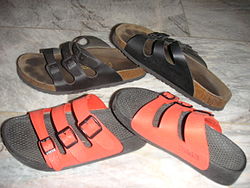Birkenstock
Birkenstock is a German brand of sandals and other shoes, notable for their contoured cork and rubber footbeds, which conform somewhat to the shape of their wearers' feet. Representative products include the two-strap sandal, the Arizona, and the Boston clog. Birkenstock shoes are worn with or without socks, the choice generally based on outside temperature.
History
The Birkenstock brand traces its roots to a German by the name of Johann Adam Birkenstock. Birkenstock was registered in 1774 as a "subject and shoemaker" in local church archives. In 1897 it was Johann's grandson, Konrad Birkenstock, who developed the first contoured insole to be used by shoemakers in the production of custom footwear. 1902 saw another first in shoemaking by Konrad when he developed the first flexible arch support to be inserted in factory-made shoes. In 1964 these inserts are developed further into a shoe by Karl Birkenstock, and what would become the Birkenstock sandal was created.
Since 1967, these shoes have been sold in the USA. American Margot Fraser "discovered" Birkenstock sandals while on a holiday in Germany. She gained relief from a foot condition, and founded a trading company called Birkenstock Footprint Sandals, Inc. in Novato, California, based on her enthusiasm for the sandals. Renamed Birkenstock Distribution USA, Inc. in 2005, it remains the exclusive importer and distributor of Birkenstock name-brand products in the United States.

Since the 1980s, Birkenstock footwear has become popular among medical professionals (e.g. dentists, nurses) and others who work on their feet. In Germany, the sandals are most often used as house slippers, but in the United States they have become a part of everyday clothing from professionals to blue collar workers, even to the entertainment industry. Heidi Klum designs footwear for Birkenstock and wears them as well.
Girls and women normally wear the Birkenstock clogs with blue jeans, and same with men. The clogs are normally worn for the winter and the sandals are normally worn for the summer. Birkenstocks are mostly worn without socks and occasionally with socks.
In the United States, Birkenstocks were first popular among young adults, a group traditionally associated with American liberalism;[1] in the early 1990s "Birks" enjoyed a surge of popularity among college-aged Generation Xers comparable to the current (2000s) popularity of flip-flops. During the 2004 U.S. presidential primary, some conservatives derided Howard Dean's supporters as "Birkenstock liberals." [2] Birkenstocks still continue to enjoy high popularity with college-aged young adults.
Certain members of the Birkenstock family also market other brands of footwear, under license from the original Birkenstock company, featuring contoured footbeds. These brands include Betula, Tatami, Papillio, Birki's and Footprints. In 2007, Birkenstock Distribution USA, Inc. was acquired and formed into a new corporation named Birkenstock USA, LP.
Punk rock band NOFX featured a song on their 1994 album "Punk In Drublic" inspired by the footwear called "Jeff Wears Birkenstocks". The song includes the line "Jeff Don't Wear Regular Shoes". Tool referenced Birkenstocks in their song "Rosetta Stoned". Birkenstocks are also mentioned in the Toad the Wet Sprocket/Glen Phillips song, "Easier", in the line, "I was 18, so were you. I was that Birkenstock, geek-rock dude".
In the American TV show The Office, Dwight Schrute keeps a spare pair of Birkenstocks in his car for special occasions.
During a concert in L.A., the band Jane's Addiction was playing the song "Ain't No Right", when Perry Farrell the band's lead singer was struck with a Birkenstock shoe. After the incident, the singer stopped and exclaimed that "What kind of person thows a Birkenstock, he obviously has no fashion sense."
References
Further reading
- "Chasing Birkenstocks". Sociology of Work Leisure and Consumption. Lewis & Clark college. 1997. Retrieved 2007-03-27.
